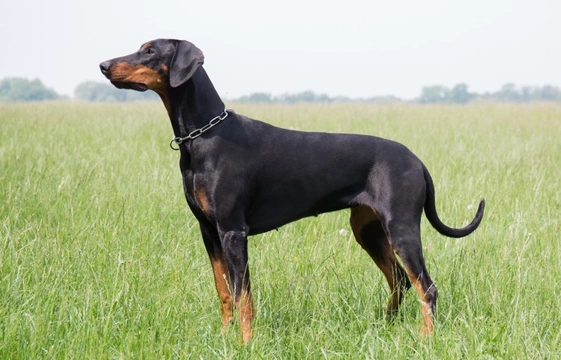
Narcolepsy DNA testing for the Doberman pinscher dog breed
The Doberman pinscher is a very handsome-looking dog that most of us recognise instantly, and they’re also one of the more popular large dog breeds in the UK as well as the 44th most popular overall. Doberman pinschers are recognised within the Kennel Club’s working grouping, which reflects their long and distinguished history as excellent working dogs that excel when they have a responsibility and a job to perform.
Most commonly used as watchdogs, guard dogs and deterrent dogs within both the private sector and police and military organisations across the world, Dobermans have developed a reputation for being highly alert, territorial and protective over their homes and families. That said, the breed has also been much maligned in decades past as aggressive or unpredictable animals, not helped by their portrayal as such within many popular films and TV shows.
However, a properly trained and managed Doberman pinscher is responsive, obedient, well mannered and never aggressive, and these dogs can make for excellent pets for people of all types, including families with older children.
The breed’s overall health tends to be fairly good, and Dobermans live for an average of around 9-12 years. But like most established pedigree dog breeds there are a number of hereditary health issues that can be found within Doberman breed lines more commonly than they do within dogs of other types.
The spread of some of these conditions has become so extensive that they are considered to pose a threat to the long-term health and wellness of the Doberman breed as a whole, and only by ensuring that dogs with hereditary health issues that can be passed on are not used for breeding can the further spread of such conditions be stopped or slowed down.
Some hereditary Doberman health conditions can be identified by means of DNA testing, which enables breeders to find out for sure the status of their parent stock before breeding from them. One such condition is called narcolepsy, and this is a type of sleep disorder that can also be found in people too.
In this article we will provide a basic outline of how narcolepsy affects dogs, how it is passed on within Doberman breed lines, and how to get a Doberman pinscher DNA tested to find out their status. Read on to learn more.
What is narcolepsy in the Doberman pinscher?
Narcolepsy is a type of sleep disorder that can affect both humans and dogs, and which is hereditary in nature. Dogs with narcolepsy develop the condition due to a defect in a certain gene that is responsible for encoding their hypocretin receptors, and this has now been pinpointed as the genetic origins of narcolepsy in the Doberman pinscher breed.
Dobermans with narcolepsy tend to be excessively sleepy during the day, and prone to fits of cataplexy, which means that the dog will appear to fall instantly asleep or pass out without warning at any time, even if in the middle of physical activity. Affected dogs also transition very quickly – almost immediately in some cases – between being awake and being deep in the throes of REM sleep.
How is narcolepsy inherited in Doberman pinschers?
Narcolepsy in Doberman pinschers is not a contagious condition, and it only develops in dogs that have inherited the necessary combination of gene faults for the affected form of the condition from their parents. Even if both parent dogs appear to be totally healthy, one or both of them might still be a carrier for narcolepsy and so, able to pass carrier or affected status on to their own offspring.
Dogs are assigned with a status of either clear, carrier or affected, and finding out a dog’s status for sure can only be achieved with DNA testing. However, if you know the status of any two parent dogs in a mating match, you can predict the status of their offspring too, as narcolepsy is passed on by means of autosomal recessive heredity, which follows a predictable pattern.
Here is how to work out the status of a litter from the status of their parents:
- Two affected dogs will have affected offspring.
- Two clear dogs will have clear offspring.
- Two carrier dogs will produce offspring that each has a 50% chance of being a carrier, a 25% chance of being clear and a 25% chance of being affected.
- A clear dog and an affected dog will have a litter of carriers.
- A clear dog and a carrier will produce offspring that each have a 50:50 chance of being clear or carrier respectively.
- A carrier and an affected dog will produce offspring that each have a 50:50 chance of being a carrier or affected respectively.
How to get a Doberman pinscher DNA tested for narcolepsy
To find out the status of your own Doberman pinscher for narcolepsy, they need to be DNA tested. If you undertake testing as part of a responsible breeding programme with a view to producing a healthy litter, both prospective parent dogs must be tested to return a definitive result of the litter’s chances.
To get your Doberman pinscher DNA tested for narcolepsy, just let your vet know your plans and ask them to book an appointment to take a DNA sample from your dog. This will then be sent away to the relevant canine genetics laboratory, who test the sample and return the results of its findings to the dog’s owner.



